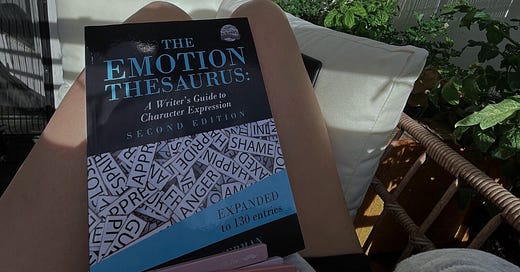I’ve been working on my debut novel for three years.
The idea for the story first hit me in 2022 in a semi-conscious nightmare, during that misty twilight sleep that straddles the space between awake and not. I remember waking up and once I shook off the creeps, I thought to myself: “That would make a really fucking good book. Someone should write it.”
At this point, I only adored books. And although I did write, I wasn’t a writer. But I always had been a reader.
It began as a spoken story, one I would tell at parties and social gatherings—to my friends and family, to near strangers I met on trips out of town.
I remember the first time I told my story at a work holiday party while my colleague and I threw darts in the back of the brewery.
I even told the story on a bachelorette trip to a table full of new acquaintances. And from time to time, we’d get distracted or interrupted by the waiter bringing another margarita or bowl of chips. Without fail, one of the girls would bring it all back into focus with an eager “Ok, and then what?”
And the more I shared it, I learned how it needed to be told. I learned where to plant curiosity seeds, where to give dramatic pauses, how to adjust the intonation of my voice.
And every time, I’d relish the way their jaws would drop and goosebumps would rise on their arms as it ended.
Undoubtably, there’s a special magic to spoken stories.
It wasn’t until many months later that I actually sat down to try and put it on a piece of paper with some coherent sense.
I knew it would be challenging to meld my story’s morally complex protagonist with the excruciating fabricated realities in a book, written from a first-person perspective rather than the third-person omniscient perspective with which I’d narrate it aloud, but I wasn’t prepared for exactly how daunting it would feel to start.
I plotted out every single chapter down to the word count allowances. Generated formulas in excel based on the three-act structure and when various plot points had to happen. Then I began writing the first few chapters.
I stopped as soon as I decided I was in over my head.
Without any spoilers, I came to realize that achieving any semblance of plausibility would be my greatest hurdle when sharing my story as a book.
Readers have the benefit of time—time to decide if they’re enthralled enough to keep reading. Time to put the book down and revisit it at a later date. Time to decide it’s not hitting the spot.
A listening audience, like those I was comfortable with, hung on every word I said as I shared my story. Partially because it was a quicker narration; there was no pressure to deliver a fully-fledged character. This is different from a written novel and definitely different from an audiobook experience.
When you verbally share a story, every choice of word isn’t as important as is the way you say your words (I have my background in theatre to thank for that lesson) but I quickly determined this wasn’t the case when I sat down to write.
And so it went: I would write a few chapters, reread and rewrite, critique myself into oblivion, stop writing altogether, then fall into an existential crisis over how I was going to tell my story.
A friend shared with me the secret sauce…spoiler alert: you just have to write.
I’ll fast-forward to where I sit now after a brief hiatus from writing. My manuscript is now a feverish 32,000 words with a hoard of friends and family allegedly excited to read it. (That may have been my second lesson learned—sometimes, a step back and some time away solves the things that aren’t immediately apparent how to fix.)
I know the next story will come easier, more organically. But I’m grateful to this story for taking its sweet time, for all that I learned while working tirelessly to coax it out onto the page.




